Composers
Born in Paris, Benjamin Godard was a student of Henri Vieuxtemps. He entered the Conservatoire de Paris in 1863 where he studied under Vieuxtemps (violin) and Henri Reber (harmony) and accompanied Vieuxtemps twice to Germany. He composed music with great facility.
In 1876, his Concerto romantique was performed at the Concerts Populaires, and other of his large works were also performed at these concerts. In 1878, Godard was the co-winner of the Prix de la Ville de Paris. His winning composition, a dramatic symphony entitled Le Tasso, remains among his most admired works.
From that time until his death Godard wrote a surprisingly large number of compositions. These include eight operas, among them: Jocelyn - the "Berceuse" from which remains Godard's most well-known composition - was given in Paris in 1888; Dante, played at the Opéra-Comique two years later; and La Vivandière, left unfinished and completed by another hand. This last work was heard at the Opéra-Comique in 1895, and has been played in England by the Carl Rosa Opera Company. He became a professor at the Conservatoire de Paris in 1887, and was made a Chevalier (Knight) of the Légion d'honneur in 1889.
Godard was opposed to the music of Richard Wagner and also highly critical of Wagner's anti-semitism. Godard's musical style was more in tune with those of Felix Mendelssohn and Robert Schumann.
Godard's long list of works in other forms included three symphonies: Symphonie gothique (1883), Symphonie orientale (1884, and Symphonie légendaire (1886); Concerto romantique for violin and orchestra (1876), two piano concertos, three string quartets, four sonatas pour violin and piano, a sonata for cello and piano, two piano trios, and various other orchestral works.
Among his piano pieces may be mentioned the 2nd Mazurka, the 2nd Valse, Au Matin, Postillon, En Courant, En Train, and Les Hirondelles. Florian's Song is also very popular in many arrangements. He wrote four sonatas for violin and piano. One of these contains a scherzo written in the unusual time signature of 5/8. He wrote more than one hundred exquisite songs.
According to the Encyclopædia Britannica Eleventh Edition, "Godard's compositions are unequal, if only because his productivity was enormous. He was at his best in works of smaller dimensions. Among his more ambitious works, the Symphonie légendaire may be singled out as being one of the most distinctive." His music has also been noted for its charm.
Godard died in Cannes (Alpes-Maritimes) from tuberculosis, and was buried at the family plot in Taverny (Val-d'Oise).
Recently Added
| Country: | France |
| Period: | Romantique |
Biography
Born in Paris, Benjamin Godard was a student of Henri Vieuxtemps. He entered the Conservatoire de Paris in 1863 where he studied under Vieuxtemps (violin) and Henri Reber (harmony) and accompanied Vieuxtemps twice to Germany. He composed music with great facility.
In 1876, his Concerto romantique was performed at the Concerts Populaires, and other of his large works were also performed at these concerts. In 1878, Godard was the co-winner of the Prix de la Ville de Paris. His winning composition, a dramatic symphony entitled Le Tasso, remains among his most admired works.
From that time until his death Godard wrote a surprisingly large number of compositions. These include eight operas, among them: Jocelyn - the "Berceuse" from which remains Godard's most well-known composition - was given in Paris in 1888; Dante, played at the Opéra-Comique two years later; and La Vivandière, left unfinished and completed by another hand. This last work was heard at the Opéra-Comique in 1895, and has been played in England by the Carl Rosa Opera Company. He became a professor at the Conservatoire de Paris in 1887, and was made a Chevalier (Knight) of the Légion d'honneur in 1889.
Godard was opposed to the music of Richard Wagner and also highly critical of Wagner's anti-semitism. Godard's musical style was more in tune with those of Felix Mendelssohn and Robert Schumann.
Godard's long list of works in other forms included three symphonies: Symphonie gothique (1883), Symphonie orientale (1884, and Symphonie légendaire (1886); Concerto romantique for violin and orchestra (1876), two piano concertos, three string quartets, four sonatas pour violin and piano, a sonata for cello and piano, two piano trios, and various other orchestral works.
Among his piano pieces may be mentioned the 2nd Mazurka, the 2nd Valse, Au Matin, Postillon, En Courant, En Train, and Les Hirondelles. Florian's Song is also very popular in many arrangements. He wrote four sonatas for violin and piano. One of these contains a scherzo written in the unusual time signature of 5/8. He wrote more than one hundred exquisite songs.
According to the Encyclopædia Britannica Eleventh Edition, "Godard's compositions are unequal, if only because his productivity was enormous. He was at his best in works of smaller dimensions. Among his more ambitious works, the Symphonie légendaire may be singled out as being one of the most distinctive." His music has also been noted for its charm.
Godard died in Cannes (Alpes-Maritimes) from tuberculosis, and was buried at the family plot in Taverny (Val-d'Oise).
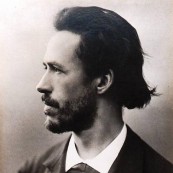

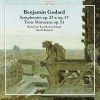

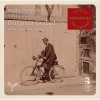


![Russian legends - Viktor Tretiakov [6 CD]](http://static.classicalm.com/repository/collection-cover/small/271-img1318800770253179.jpg)
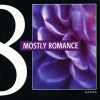
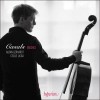
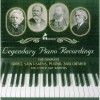
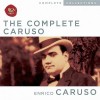
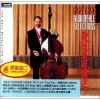
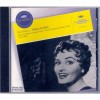

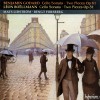
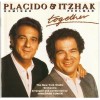

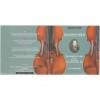
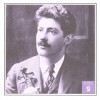
![The Heifetz Collection, Volume 19 [2 CD]](http://static.classicalm.com/repository/disk-cover/small/947-img1317413695600051.jpg)